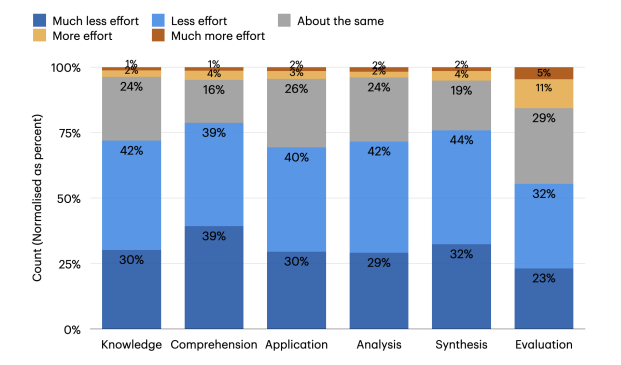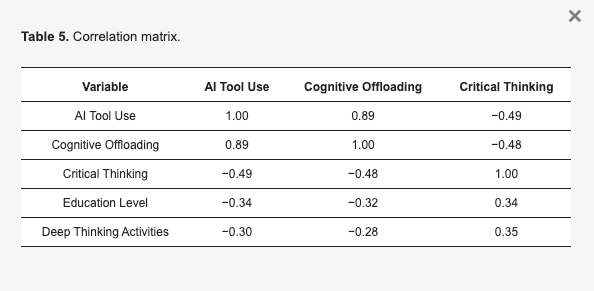Is Your Brain Over-Reliant On AI?
Two Simple Checks To Make Sure You Are Using AI The Right Way
Last month on holiday I noticed an unexpected drop in the quality of my decisions.
Whether it was where to eat, where to hike, where to shop or what to wear, I found myself listening more to my AI assistants than I’m used to.
The results were subpar: subpar dining, hiking and shopping experiences.
I don’t think this one can be notched down to just a loss of romantic wanderlust.
The causes probably run a lot deeper—my brain has grown so used to leveraging AI that I’m not as critical as I used to be about the output of these AI systems.
It’s like I’ve been slowly turning up the heat in my little pot of water, unaware that the frog in this funny old experiment was me.
For me personally, the watershed moment in AI adoption came with the release of Claude 3.5 last summer. The big leap in AI coding capabilities it brought with it had the indirect impact of massively increasing the amount of time I spent chatting to AI systems these last twelve months.
I don’t know what the watershed moment will be for you—but I want to help you spot the signs.
How To Spot You’ve Caught AI Brain
In some ways, AI is social media all over again.
As your confidence in the outputs and results of these AI systems grows, you’ll naturally start stacking the limiting beliefs in your own capabilities and forgetting what you were capable of on your own.
So an initial check to see how far down the AI rabbit hole you’ve already gone is to write down all the things your current set of AI systems and assistants do for you.
Write them down without the help of AI, of course.
Once you’ve written down the list, go over it (again, manually!) and identify all the steps where these systems need your human input to make them work.
Odds are you’ll find out that with the state of AI today, these systems are still 70-90% reliant on your input to create any kind of value.
In this exercise, the harder it is for you to disentangle your inputs from what the AI does, the higher your level of AI dependency. And the more dependent you are, the harder it will be for you to see how much its outputs and results are driven by your actions and inputs.
It hopefully shows you the extent with which you’ve identified yourself with your AI assistant.
A second thing you can do is to take a closer look at a couple of your daily tasks and see how much effort and time they take you with AI, and how much time without.
As I expect you to find in your manual analysis, a lot of the perceived value in AI tools comes from convenience rather than delivered value. They might be automating those parts of your job you don’t want to or don’t have the time to do, but that does not necessarily mean they’re doing a good job at them.
The importance of perceived value was also reported by Microsoft Research:

So it’s important to keep in mind that if you ask your AI assistant dumb questions, you’re going to get back dumb responses.
And the more you rely on your AI assistant to ask the right questions and do your cognitive work for you, the dumber you’re going to get. The funny thing is that your AI system will dumb down with you, in a neat vicious cycle of cognitive decline that has nothing to do with these AI systems and everything with how they are being used.
Recent studies by Microsoft Research (Lee et al., April 2025) and Michael Gerlich (Jan 2025) present new empirical evidence that AI dependency and cognitive offloading (where you let AI do your thinking for you) lead to a degradation of critical thinking and problem-solving skills in humans. 1-0 for Skynet.

Without going into what this means for society—I probably speak for most people when I say there are bigger issues in the world right now than nerding out on AI tools—let’s look at some ways to mitigate the worst effects of AI brain.
Keep Calm And Keep Thinking
The first and most obvious one is of course to keep thinking, reading and forming your own perspectives and opinions independent of your little AI assistant.
Here are a couple of other strategies you can apply to minimise AI dependency, fight the atrophy in your neural tissue, and keep your human edge:
Similar to Cal Newports “deep work” sessions, find tasks that can be completed without AI and block regular “AI-free” sessions. They will help you fight the atrophy in your cognitive skills. This is not hyperbole or a figure of speech by the way. Just like you start losing muscle when you stop going to the gym, there is scientific research backing a loss of cognitive skills from a lack of exercising them.
Stick a “Think Before You Prompt” mantra post-it (does anyone still use those?) on your computer monitor or get it engraved in your smartphone case. Joking of course, but a great way to exercise your problem-solving skills is to come up with your own solutions to a problem before cross-checking it with your AI assistant.
Strategically limit your use of AI. And where you’ve decided that your business, career or life would be better off with an AI assistant, become a power user. This, besides helping you fight AI dependency, is also a great quality of life hack. There are a lot of poorly implemented AI systems out there.
As both a heavy user of AI tools and as someone that develops AI solutions for a living I’d be the last person to tell you to stop using AI.
AI is as close to a superpower as mankind has come to date.
It is however very important that—if you want to use AI to amplify and improve your life—you are also aware of the downsides of using these tools.
Plus, analytical and creative thinking are still ranked much higher than technological literacy on the job market, so by becoming too AI dependent you’d be conveniencing yourself out of a job.

Sources
Lee et al., April 2025. The Impact of Generative AI on Critical Thinking: Self-Reported Reductions in Cognitive Effort and Confidence Effects From a Survey of Knowledge Workers (link)
Gerlich, M., January 2025. AI Tools in Society: Impacts on Cognitive Offloading and the Future of Critical Thinking (link)
This week in AI
Meta released Llama 4 Scout and Maverick, the first models in its next-generation open-weight AI family. These natively multimodal models feature a Mixture-of-Experts architecture and boast unprecedented context windows, with Scout supporting up to 10 million tokens, significantly advancing capabilities for developers. The models saw rapid integration across major cloud platforms like AWS, Azure, IBM Cloud, and Cloudflare, highlighting the growing maturity of the open-weight ecosystem.
Google Cloud Next 2025 focused heavily on enterprise AI and agentic systems, unveiling tools like the Agent Development Kit (ADK) and the Agent2Agent (A2A) interoperability protocol to enable complex AI workflows. Google also announced its inference-optimised Ironwood TPU chip and the ability to deploy Gemini models on-premises via Google Distributed Cloud (GDC), catering to enterprise security and data residency needs. Enhanced Gemini models with improved reasoning were showcased alongside expanded Vertex AI capabilities, including new generative media models and grounding options.
AI assistants became more personal as both Microsoft and OpenAI added memory capabilities to Copilot and ChatGPT, respectively. These updates allow the assistants to retain information across conversations for more tailored interactions, signalling personalisation as a key competitive focus. Microsoft further enhanced Copilot with "Actions," enabling it to autonomously perform tasks like booking tickets, blurring the line between assistant and agent.
Significant investment and scientific progress marked the week, including Alphabet and NVIDIA backing AI startup Safe Superintelligence (SSI) and Meta planning a $1 billion AI data center. AI accelerated scientific discovery, with Microsoft and PNNL finding a new battery material potentially reducing lithium needs by 70%. Concurrently, a US State Department-commissioned report warned of potential "extinction-level" threats from advanced AI, highlighting the ongoing tension between rapid progress and safety concerns.


I like how you tackled the issue of AI dependency head-on. Your strategies for staying sharp are spot-on. Thanks for sharing!
Damn this study has just gone viral *rightly so.* Reminding us early of the drawbacks unlike previous tech revolutions like social media. I like the idea of AI free sessions. Would just using an agent in the background still count, though? Haha i am only half joking.